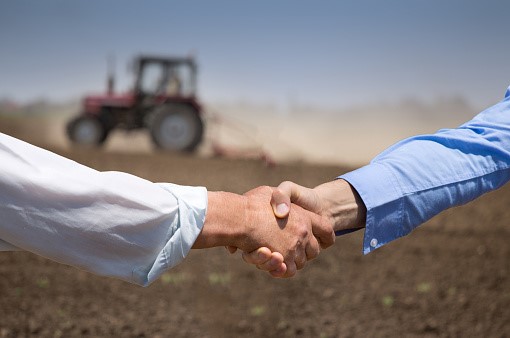Co-operation and Collaboration
The benefits of co-operation are well-evidenced. Co-operation involves farmers and others, working together to achieve a commercial objective, which they cannot achieve independently and individually. Through co-operation, members help themselves, pro-actively taking responsibility for generating value and sustainable services in which they have a common purpose.
This section aims to provide a range of different resources and materials for farmers and crofters to find out more about co-operation and collaboration and the opportunities available to them and their business.

Co-operation and Collaboration Webinar Series Recordings
The Benefits of Working Together
The benefits of co-operation are well-evidenced. Co-operation involves farmers and others, working together to achieve a commercial objective, which they cannot achieve independently and individually. Through co-operation, members help themselves, pro-actively taking responsibility for generating value and sustainable services in which they have a common purpose. To showcase the benefits of increased co-operation and collaboration we have brought together a range of expert speakers and farmers actively participating some form of co-operation to share their experiences. The Benefits of Working Together webinar will be chaired by Kerry Allison from SAC Consulting. Our guest speakers are: Anna Robertson, Project Manager, SAOS, who are the experts on co-operation and supply chain collaboration; Hector Munro, Foulis Farms, Ross-Shire, discussing the benefits of sharing machinery and Caroline Black, Backboath Farm, Arbroath, on forming an agrochemical buying group (Black Agri Services). The focus of this first webinar is informal co-operation and neighbouring, which has always been a feature of the farming community. Whilst perhaps less popular than in the past, neighbouring is a great route to share resources, reduce costs, save time, make lives easier and build relationships in a community. It makes sense on so many levels, not least for social reasons, wellbeing and on safety grounds. There are numerous informal co-operation models (e.g. benchmarking groups) being created all the time. This is an opportunity to hear from those involved in practice, why they did it, how they make it work and the lessons they have learned along the way.
The Different Types of Co-operation and Collaboration
The benefits of co-operation are well-evidenced. Co-operation involves farmers and others, working together to achieve a commercial objective, which they cannot achieve independently and individually. Through co-operation, members help themselves, pro-actively taking responsibility for generating value and sustainable services in which they have a common purpose. To showcase the benefits of increased co-operation and collaboration we have brought together a range of expert speakers and farmers actively participating in some form of co-operation to share their experiences. The Different Types of Co-ops and Collaboration webinar will be chaired by Kerry Allison from SAC Consulting. Our guest speakers are Jim Booth from SAOS, a specialist on Farmer co-operation and supply chain collaboration, Russell Brown chairman of SPC on the role of co-ops in a supply chain and how they help address the imbalance of power from the multiple retailers; Donald Ross Rhynie Farm, Tain, sharing his views and experiences of co-operation, why he does it and the benefits he gets. This second webinar will focus on formal co-operation, the various types of co-ops (marketing co-ops, producer co-ops, input supply co-ops, machinery rings, environmental and community co-ops) and the benefits they provide to their farmer members. Although the benefits of farmer co-operation are well evidenced, co-op participation levels in the UK lag those of our international competitors. Traditionally the focus of co-ops was to lower cost, get market access and improved prices – the economic benefits. Increasingly, co-ops are a route to access innovation, manage risk and market volatility, take hassle away, save time and build resilience – all to protect family farms.
Co-ops Across the World their Future Role
The benefits of co-operation are well-evidenced. Co-operation involves farmers and others, working together to achieve a commercial objective, which they cannot achieve independently and individually. Through co-operation, members help themselves, pro-actively taking responsibility for generating value and sustainable services in which they have a common purpose. To showcase the benefits of increased co-operation and collaboration we have brought together a range of expert speakers and farmers actively participating in some form of co-operation to share their experiences. The ‘Co-ops across the World (their future role)’ webinar will be chaired by Kerry Hammond from SAC Consulting. Our guest speakers are Robert Logan from SAOS, a specialist on Farmer co-operation and supply chain collaboration; George Noble from SmartRural, a co-operative rural connectivity and data business; TJ Flanagan, CEO, ICOS, who have seen great success in large scale dairy and other co-ops in Ireland. This final webinar explores the scale of opportunity for producers by looking at successes and lessons from further afield, with agricultural co-op examples from across the UK, Europe and the globe. We will explore examples that also include opportunities for new farmer-led developments here in Scotland, including new crops and services. This is complimented by the near-hand experiences from Ireland, where agri-co-op participation rates are some three times here in Scotland, where nearly every farm is involved in some form of co-operation and/or formal cooperative. Ireland is home to a few highly adapted businesses that are also world renowned agricultural co-ops.
Publications and Other Materials
Co-Operation and Collaboration Podcast
Food & Drink specialist consultant, Kerry Hammond facilitates an hour with some of Scotland ( & Ireland’s) most enthusiastic collaborators.
Featuring Anna Robertson the Co-Op and training manager at SAOS, Hector Munro from Foulis Farm (Black Isle) , Caroline Black Director of Black’s Agri-services (Angus), Jim Booth Head of CoOp Development at SAOS, Donald Ross (from Rhynie Farm Tain) & Director of Scottish Agronomy, and TJ Flanagan, our international speaker, CEO of ICOS the Irish Cooperation Organisation Society.
Powerpoints and Additional Resources
The Benefits of Working Together Presentation –the slides presented in Webinar 1
The Different Types of Co-operation and Collaboration Presentation- the slides presented in Webinar 2
Co-ops Across the World - Their Future Role Presentation - the slides presented in Webinar 3
Smart Rural Use Cases Flipbook – examples of targeted use of sensors and IoT technology with the co-operative rural connectivity business SmartRural
Sign up to the FAS newsletter
Receive updates on news, events and publications from Scotland’s Farm Advisory Service

